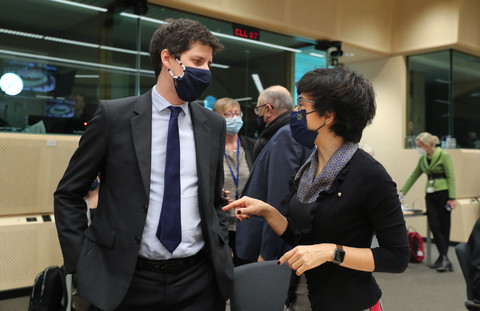[ad_1]

EU agriculture minister on Tuesday (23 March) discussed aspects of the Common Agriculture Policy (CAP) reform that remain problematic – ahead of a so-called ‘super trialogue’ on the issue later this week.
The reform package, proposed by the European Commission back in 2018, includes regulations dealing specifically with national strategic plans, with financing, management and monitoring of the CAP, and common market organisation of agricultural projects.
The Portuguese EU Council presidency is the middleman in the three legislative proposals, but the European Parliament has one lead negotiator per each file.
Aiming to reach a compromise on the whole package reform by May, Lisbon has organised on Friday (26 March) a joint negotiation of the three regulations – the so-called ‘super trialogue’ – to allow an approximation of positions.
“We cannot keep our general approach untouched. If we do not find elements to move forward, we will not reach an agreement in this semester,” Portuguese minister of agriculture, Maria do Céu Antunes, warned ministers.
Should the trialogues fail to reach a compromise soon, the new CAP rules might not come into force in 2023, Antunes previously warned. Meanwhile, transitional rules apply for this year and 2022.
“Maintaining this calendar [ie, agreement in May] is vital to leave sufficient time for member states to prepare CAP strategic plans by December 2021,” EU commissioner for agriculture Janusz Wojciechowski told ministers.
“We need to focus on reaching an agreement, negotiation need to speed up and we need flexibility from all sides,” he added.
More than 45 technical meetings and trilogue discussions have taken place so far, revealing “marked divergent positions” between members states and the European Parliament.
The CAP, which accounts for over €350bn of the next seven-year EU budget, is based on two big strands of payments: direct payments to farmers, and other support for rural development.
Under its proposal, the European Commission seeks to strengthen the CAP by establishing better targeting of support, prioritising small and medium-sized farms and encouraging young farmers to join the profession.
To do so, the EU executive proposed to introduce an obligatory reduction of payments (capping) and a mandatory payments scheme for small farmers, making sure that only “active farmers” receive support – ideas also supported by MEPs.
However, in October, member states decided to make all three initiatives voluntary.
Wojciechowski on Tuesday called on member states to reconsider their position and support the commission proposal, pointing out that “capping has as objective, supporting those in need”.
Farmers – or just landowners?
Additionally, he said that it is important to have “a common denominator” to determine who the farmer is – ensuring necessary flexibility for member states.
“There are people that are not genuine farmers that are receiving money because they actually own land, and these people regard their farms as an investment,” Wojciechowski told agriculture ministers.
“We need to make sure the money really ends up in the pocket of farmers,” he added.
The Portuguese presidency is willing to maintain the council position on the voluntary aspect of these instruments. But it aims to reach a compromise on other issues, such as the definition of “active farmer”, or increasing the income support for young farmers.
Eco-percentages
Additionally, a document about the state of play of the negotiations reveals that “further work is needed… on eco-schemes” – a percentage that determines how much money from the direct payments should flow into green projects in the agriculture sector.
Member states want to put aside 20 percent of direct payments for such mandatory eco-schemes, while MEPs require at least 30 percent.
Last week, the Committee of the Regions called for the objectives of the Green Deal and the Farm to Fork and Biodiversity strategies to be incorporated into the regulation on national strategic plans – making them binding, so all the member states are required to meet them by 2027.
Meanwhile, 14 member states, led by France, proposed allowing farmers to correct application errors made in good faith (including after deadlines) without being subjected to financial penalties.
This may include: forgetting to tick an aid application when it has been applied for previously, forgetting to send a supporting document, and failure to declare animal numbers for area-based payment aid with density livestock obligations.
This proposal is part of a position paper put forward by Austria, Cyprus, Czech Republic, Denmark, Finland, France, Greece, Hungary, Ireland, Italy, Luxembourg, Poland, Romania, and Spain, which calls for a simplification of the CAP in general.
[ad_2]
Source link